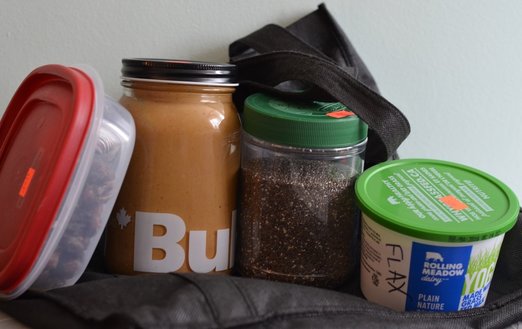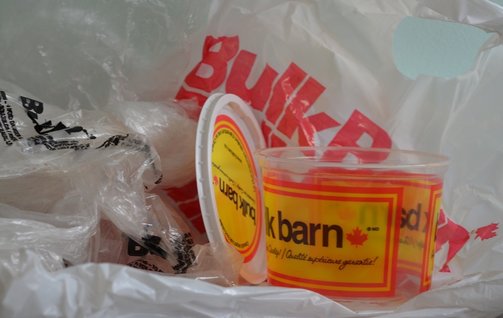|
By Chris Hay
“Zero waste living” seems like a revolutionary new movement, but at its core it’s actually a simple and obvious idea. Reducing our trash as much as possible, ideally to nothing, would save us money and reduce pressure on the environment. Many other movements are closely related: voluntary simplicity, collaborative consumption (sharing), and the I had a brush with this movement when I heard about Bulk Barn implementing a new system. You can now bring your own reusable containers into the store to fill with food, rather than using the single-use plastic bags and containers they provide. Having recently heard about the tragedy of plastic in our oceans, and already owning several empty containers waiting to be used, this was my perfect opportunity to make a positive change. I washed and gathered up a variety of reusable containers and put them in a reusable cloth bag. At the store the cashier quickly inspected and weighed each container, applying to each one a tiny sticker with the weight written on it. An elderly woman asked what was going on, so I explained the new program to her. She seemed intrigued – maybe once more people see it happening, it will catch on! I went to the bulk bins and filled each container with what I had planned. At the checkout the cashier subtracted the weights of the containers from the total when ringing it up. It was all surprisingly speedy and easy!
Before you go, definitely check out Bulk Barn’s policy and container standards on their website. I’ll highlight a few things. Your containers need to be totally spotless (literally, no water spots!) and mason jars with rusty metal lids may not be accepted. Make sure you carefully wash and dry your containers, and inspect them after to make sure there’s no residue stuck in a corner. When filling your container, don’t pour back and make sure the scoop does not touch the sides (pour over the top). If you want to get anything liquid (e.g. peanut butter), I recommend choosing a container with as wide an opening as possible. Otherwise it will be hard to fill without making a mess (the scoops are quite large). Before your next visit, wash your containers again and remove the old sticker. When the cashier inspects your containers before weighing they may reject any of your containers for any reason, in which case don’t stress using bag(s) and you’ll know for next time. Let’s make life easy for the cashiers so the new program is well received!
Like most environmental movements, using reusables at Bulk Barn can seem like too small an action to make a difference. I saved a few light little bags from going into the garbage – big deal, so what? But a lot of small, steady water drops in a bucket and before you know it, the bucket is overflowing. What if we didn’t need to keep refilling Bulk Barn’s massive rolls of plastic bags? And consider that you are now not buying the product from a regular grocery store in a container that would be even more wasteful. When I was a kid, my family and most people I knew didn’t recycle at home or use reusable cloth bags for groceries. As years went on (and with a little pressure) these activities became completely commonplace and natural. That’s a big difference! I hope shopping with reusable containers can undergo the same process, moving from niche to the new normal. For me, at least, I’ve already found this to be a simple switch, and I feel empowered and ready to move onto the next positive lifestyle change.
Besides reducing waste, there is a bigger lesson here. How and why did Bulk Barn change their policy and embrace this new idea? The story goes that there was always a community writing in, fighting for the retailer to allow refillable containers, but it wasn’t until one lady went ahead and broke store policy (using her own containers, at the risk of reprimand from the store) that policy change took place. It seems that for changes like this to happen it takes finding a good idea, many people taking action, and a little bravery along the way. Let’s be a part of these changes, a part of making the world a better place (one less bag at a time)!
5 Comments
7/23/2017 01:55:50 am
I see the greatest contents on your blog and I extremely love reading them.
Reply
11/6/2018 08:07:07 pm
Our world is hastily approaching the point where our resources cannot accommodate our growing needs. We are steadily increasing in terms of population, we all have needs, and those needs are very hard to meet when we look at our present state. From this point, we can then say, that zero waste movement should be implemented worldwide. We should conserve our resources as much as possible. We should not let our greed get the best of us. We should leave this world a better place for generations ahead of us.
Reply
1/10/2018 04:48:05 am
Thanks for the informative and helpful post, obviously in your blog everything is good..
Reply
5/21/2023 06:45:34 am
Zero waste? Now I know that something like that is impossible. It can't be achieved.
Reply
Leave a Reply. |
ELB MembersBlogs are written by ELB members who want to share their stories about Ontario's biodiversity. Archives
January 2023
Categories
All
|




 RSS Feed
RSS Feed